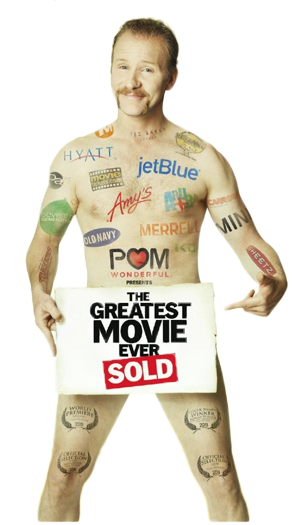 The Greatest Movie Ever Sold (presented by Pom Wonderful) is proof that we have beaten bin Laden. Or at least, provides hope for the future of the American way. Morgan Spurlock (who you might remember from fast-food takedown Super Size Me) faces commercialization and product placement head on, and in exposing it, finds positives. He finds sponsors that understand where he’s going with the film and are fully behind the idea. They’re in on the joke, and that‘s a great selling point. It’s also good for the consumer.
The Greatest Movie Ever Sold (presented by Pom Wonderful) is proof that we have beaten bin Laden. Or at least, provides hope for the future of the American way. Morgan Spurlock (who you might remember from fast-food takedown Super Size Me) faces commercialization and product placement head on, and in exposing it, finds positives. He finds sponsors that understand where he’s going with the film and are fully behind the idea. They’re in on the joke, and that‘s a great selling point. It’s also good for the consumer.
Greatest Movie examines the effects of self-awareness on advertising, and finds the two are not mutually exclusive. This is a good thing. Advertising is not going to disappear any time soon; it has become part of our global culture. And even if it could, would we really want it to? Marketing and advertising are effective methods of disseminating information. What we don’t need is false advertising. The more enlightened companies are – in terms of what goes into making their products and what their customers are looking for – the more progress we can make as a society.
One of the major goals of humanity – of existence, in general – should be to become more self-aware. To explore the boundaries of awareness, as beings in this universe (as part of this universe). How much can we realize about the “now,” the present? How far does our perception extend, and what factors are influencing it, in real time?

Linking up with other beings to form larger networks is a tool in this quest. Corporations and companies of all kinds are these conglomerates (used without the evil connotation that word has acquired), with resources and insights far greater than any one person alone could hope to achieve.
Nations are examples of these greater-than-one organizations. But our affiliations are slowly shifting away from geographic and political boundaries. Because of the internet (itself a fast-growing omni-being), corporations are no longer shut off from regular people. They can connect a person in Delhi, India with one in Delhi, New York, as coworkers or as like-minded consumers. Social networks are continually enhancing these links, be they person-to-person, company-to-company, or person-to-brand.
US Congress recently afforded corporations more of the same rights as a person, as related to political spending and free speech. What Spurlock highlights is that if corporations are people, they should embrace other parts of being human. They should have a sense of humor. Care about their effect on the environment. And be self-aware, engaging their audience for feedback and the betterment of their products. Consumerism is dead. Long live consumerism.